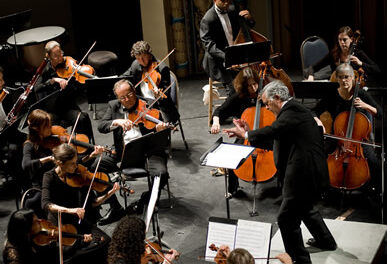Those who turned out for the Ciompi Quartet’s third summer concert on June 1 got more than they may have bargained for as Italian pianist Epifanio Comis and a large string orchestra performed music by Italian and Russian composers in Reynolds Theatre. That’s because Duke’s Summer Festival of Music, of which this concert was a part, tends to involve only chamber music ensembles. As a result, the sight of around 30 musicians on the stage marked a big shift for the presenters and the audience, too. The music was hardly typical of this series, either. The program began with “Summer,” from Vivaldi’s Four Seasons, which Hsiao-mei Ku played well, once over some minor intonation problems at the outset, and in which she received energetic and incisive support from her colleagues. This wasn’t HIP (an historically-informed performance) in any sense of the term. The continuo was realized by harpist Emily Laurance, who was on hand for a contemporary Italian piece, heard later, and cellist Fred Raimi, who (like Ku) is a member of the Ciompi Quartet. The edition sounded like one of those mid-20th-century things that folks like Guido Cantelli used to reintroduce this music to the world, back when performances and recordings of Vivaldi were fairly rare; it was in fact an arrangement by Alceo Toni (b.1884), but with harp substituted for harpsichord in this realization. Laurance, who told us during the intermission that she is an old hand at this sort of thing, played brilliantly. Conductor Tonu Kalam set generally brisk tempi, and the finale was positively exhilarating. His presence and that of several Chapel Hill-based instrumentalists underscored the praiseworthy cooperation that now exists between the music departments of Duke and UNC.
Guest pianist Comis is the Ciompi Quartet’s Italian connection, details of which are in cvnc‘s review of the previous concert in this series, contained elsewhere in this issue. The ties between Comis and our great resident quartet have enhanced the international travels of both; CQ violinist Eric Pritchard, who served as Concertmaster on the present occasion, reports that “The next venture in this collaboration will be a concert and series of master classes by the Ciompi Quartet at the University of Catania” in April 2003. Comis played Shostakovich’s First Piano Concerto, a charming, saucy work bearing heavy French influences, that is scored for piano, trumpet and strings. Don Eagle, on loan from the NC Symphony (who thus missed a rain-plagued Summerfest engagement), was the stellar trumpet virtuoso. The work is rarely performed, in part because orchestras are reluctant to have woodwinds, percussionists and all of their brass players but one sitting out in the hall during concerts. The loss is ours, for it and its exceptionally beautiful companion, the Second Concerto, are stunning pieces. The Duke performance had a lot going for it. Comis brought a measure of individuality to the score, emphasizing phrasing and in some cases rhythms that others have handled differently while meeting its technical demands well. Eagle did an altogether admirable job, and the massed strings played crisply under Kalam’s watchful leadership.
There was more of the same in Giuseppe Cantone’s “La Dea Bianca,” for string orchestra, harp (Laurance) and percussion (Lee Ballard), although the work itself left many members of the audience grumbling. It lasted only six minutes and was penned in 2000 but seemed a throwback to the listener un-friendly academic style that some people feel helped drive audiences away from concert halls a generation or so ago. There were few complaints about the performance itself, however; and the players redeemed themselves in the eyes (and ears) of the audience with a glowing reading of Tchaikovsky’s Serenade for Strings, which brought the concert to a close. It was, believe it or not, bracing to hear this given in a live performance. It’s one of those works-there are several by this composer-that we try to avoid, but in fact the Serenade is rarely heard in concert here and is much better known on CDs. As it happens, this writer has been filling gaps in his collection of Mengelberg recordings, and the Dutchman had a particular affinity for this piece. If he led performances of it that Tchaikovsky would have recognized (a great big “if”), then Kalam’s reading was pretty bare-bones. Devoid of Mengelberg’s slipping and sliding around, however, the Duke reading seemed exceptionally vibrant and fresh, as if we were hearing the familiar music for the first time. At the outset, ensemble seemed slightly tentative, as indeed was the case at several other (isolated) points during the evening. This was, after all, something of a pick-up band, with members from all over. As a result, here and there the audience heard a collection of strong individual players whose efforts didn’t always meld completely. The Tchaikovsky got better and better as it progressed, however, and at the end Kalam and Co. whipped it up into something bordering on controlled frenzy, to the obvious delight of the audience, which brought the visiting Maestro back repeatedly before finally letting him and his instrumentalists retire.
For the record, the portions of the program notes that were translated by Steven Lawson were, as our colleagues Joe and Elizabeth Kahn noted in their review of the May 30 concert in this series, ridiculous in the extreme.











